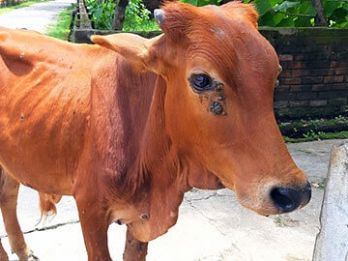Lumpy skin disease
Lumpy skin disease (LSD) affects cattle and buffalo and is caused by a capripox virus.
In naïve populations, up to 45% of the animals are affected. While death from infection with LSD is relatively low, significant animal welfare issues and significant production losses can occur.
Strict import protocols have managed to keep Australia free from LSD, which is advantageous for unrestricted market access for livestock.
An incursion of LSD will result in the disruption of trade in livestock and livestock products. This will impose restrictive trade conditions by trading partners, as well as costs associated with disease control and eradication.
Global detections of lumpy skin disease
Originally restricted to Africa, LSD has been detected closer to Australia.
- 2012 onwards – LSD spread from Africa and the Middle East into south-eastern Europe.
- 2019 – LSD was reported in Asia and the Pacific region.
- 2020 – LSD continued to spread across continental Asia with many countries reporting outbreaks.
- 2021 – the disease was confirmed in Vietnam, Thailand, and Malaysia.
- 2022 – Indonesia reported confirmed cases.
Symptoms of lumpy skin disease
Infection typically causes firm, raised nodules up to 50 mm in diameter, which develop on the skin around the head, neck, genitals, limbs, and other parts of the body.
Other characteristic symptoms of LSD may include:
- acute fever and depression
- scabs in the centre of the nodules which leave large holes that can become infected after the scabs fall off
- swelling of limbs, brisket and genitals
- watering eyes and increased nasal and salivary secretions
- marked reduction in milk yield
- abortion in pregnant animals.
Some animals with the disease may be asymptomatic (have the disease but not show signs).

How lumpy skin disease is spread
The disease is spread primarily by biting insects, such as certain species of flies, mosquitoes and possibly ticks.
The disease can also be spread by fomites, including contaminated equipment and in some cases, directly from animal to animal.
LSD virus is present in high concentrations in skin nodules and scabs on affected animals and can be isolated from:
- blood
- saliva
- ocular and nasal discharges
- semen.
LSD virus can remain in blood for up to 21 days post-infection but shedding in semen may continue for at least 42 days post-infection.
The disease does not pose a risk to human health.
How you can reduce the spread of LSD
If LSD occurred in Australia, we would want to eradicate it as quickly as possible.
Australia’s Veterinary Emergency Plan (AUSVETPLAN) contains the nationally agreed approach for the response to an outbreak of LSD.
Register your animals
All properties with livestock must have a property identification code. See our livestock property registration page for more details.
More information
- Emergency Animal Disease Bulletin No. 121 – Lumpy skin disease
- Emergency animal diseases – a field guide for veterinarians
- Lumpy skin disease – Agriculture Victoria
- Lumpy skin disease – Business Queensland
- Lumpy skin disease on the radar – NT Department of Industry, Tourism and Trade
- Lumpy skin disease – Dept of Agriculture, Water and the Environment
This page includes a video of Australia’s Chief Veterinary Officer, Dr Mark Schipp, providing information about lumpy skin disease, including its potential impacts and the need for disease vigilance.


